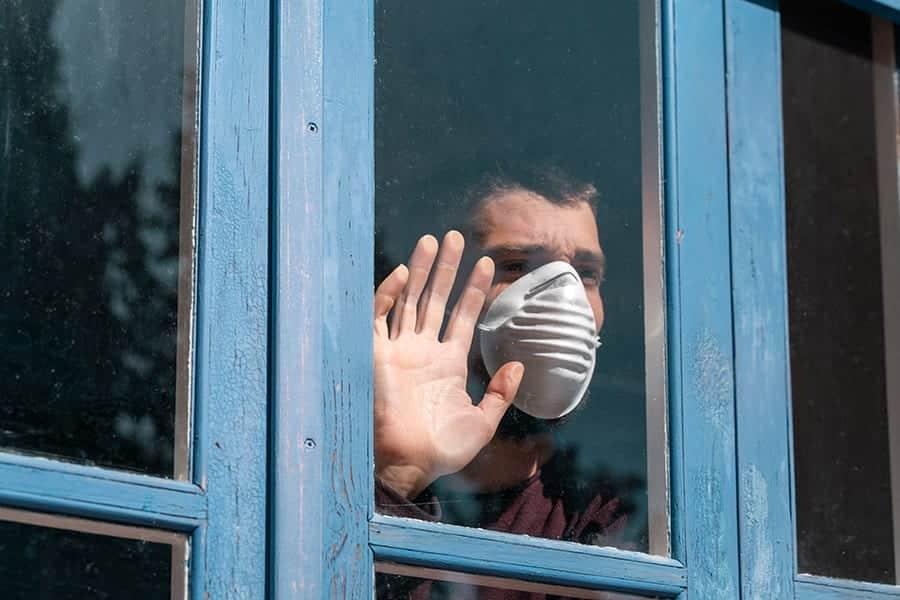A relapse occurs when someone in recovery from drug or alcohol abuse suddenly breaks a sustained period of abstinence. The National Institute on Drug Abuse shows that around 40%-60% of recovering alcoholics end up relapsing into another cycle of addiction after getting sober. But that’s in normal global health conditions.

Now, there’s a global pandemic, COVID-19, to mix into those statistics. Where recovering addicts and alcoholics would typically spend their afternoons catching up with a friend over coffee, they’re now forced to stay at home away from their peers. When they would usually go to alcoholics anonymous meetings or other support groups, they’re now alone and accountable to no one.
Now might be a more tempting time than ever to pick up a drink or a drug (no one’s watching, right?) But with more resources available than ever for those suffering from substance abuse issues, staying sober – even during a pandemic – is more possible than ever. It’s also way more rewarding.
At all times, an addict is either fueling their recovery or their relapse. So which will you choose during self-quarantine?
Rule 1: Fill In Your Empty Time Slots
Part of getting – and staying – sober means forming new, healthy habits! However, self-isolation is probably really throwing a wrench in your sober wellness routine. A disruption in your daily schedule is bound to disrupt your emotional stability, too. So, it’s crucial to find ways to combat the new imbalance you’re experiencing during COVID-19 – especially if you’re in recovery from a substance use disorder. Make sure that you’re filling your new free time with activities that contribute to your recovery and forming a new, COVID-friendly routine. This way, you can stay grounded and consistent during the Coronavirus outbreak.

Journalling, art, exercise, or reading are all healthy ways to pass your time. Or, being of general service to those around you (even if they aren’t physically around you) like calling a friend in need can distract you from any loneliness or resentment you’re feeling about your situation. Where before you may have attended in-person meetings to prevent or combat addictive thoughts or urges, you may need to begin filling in those slots with other methods of socialization.
No matter what, don’t leave yourself with too much idle time. Relaxation is great, but too much boredom and rumination can leave you vulnerable to relapse.
Rule 2: Be Aware Of Your Triggers
During our government’s orders for social distancing, many people recovering from drug and alcohol abuse are facing an all-too-familiar feeling of their pasts: isolation. Unfortunately, isolation can be one of the biggest triggers for a relapse on drugs or alcohol. Not only that but being isolated in toxic family environments can compound the uncomfortable aspects of social isolation. There are ways to combat the ill effects of isolation and other uncomfortable feelings and prevent relapse during the coronavirus outbreak. Still, it all begins with a thorough awareness of what triggers you to want to use drugs or drink alcohol.
Some common triggers for relapse include:
- Uncertainty
- Chronic pain
- Loneliness/isolation
- Traumatic memories (or the resurfacing of traumatic memories)
- Fear
- Anxiety
- Stress
- Feeling overwhelmed
- Grief or death of a loved one
- Relapsing into mental illness, like depression, anxiety, bipolar, or eating disorders
- Strained relationships with family members
- Financial Insecurity
With awareness of what triggers you to want to relapse, you can take action to protect yourself from revisiting a darker path.
Rule 3: Utilize Digital Communication
No matter what area of the world you’re living in, you can Zoom.
Zoom is an “American remote conferencing service” (according to their website) that anyone can use for free, making any online support group affordable. And, at the moment, it’s totally revolutionizing recovery.
The evolution of Zoom hit a sharp incline once the novel coronavirus started spreading quickly. After the overall suspension of most public gatherings in the US, Zoom meetings and other online meetings were the only choices for many addicts and alcoholics to continue connecting with their fellows.
Online 12-step meetings have existed for a while. But the most recent global pandemic gave this digital medium the boost it needed to take stride in the online recovery world.

Besides just making phone calls to friends in recovery, considering joining an online 12-step program either through Zoom or another digital platform. Virtual AA meetings, or AA meetings online, will provide the outlet, accountability, and connection that is almost equivalent to in-person gatherings.
There are many other digital platforms that you can use to communicate with other sober people in an organized setting if you don’t wish to use Zoom or other video conferencing platforms. For example, hundreds of blogs and forums give recovering addicts the opportunity to connect and relate that they crave.
Rule 4: Stay Accountable
No matter what, the most important thing to do when you’re isolated in recovery is to stay accountable to someone other than yourself via telephone, text, or through some other means of communication.
No, this doesn’t mean you shouldn’t trust yourself to be alone. It means being alone is hard, especially when you’re an addict. It means having a couple important, trustworthy people that you can check in with every day, whether it is a family member, sponsor, counselor, therapist, or friend, who will give you the strong support you need to continue in a sober direction.
With awareness, strategic planning, consistent communication, and accountability, staying sober during the most recent viral outbreak is possible.
No matter what, Hotel California by the Sea is here to help you achieve long-lasting recovery from drugs and alcohol. If you or a loved one does relapse on drugs or alcohol during the COVID-19 outbreak, seek a treatment program for alcohol and drug addiction immediately.
